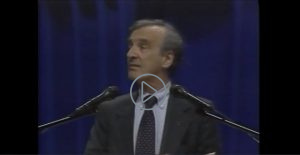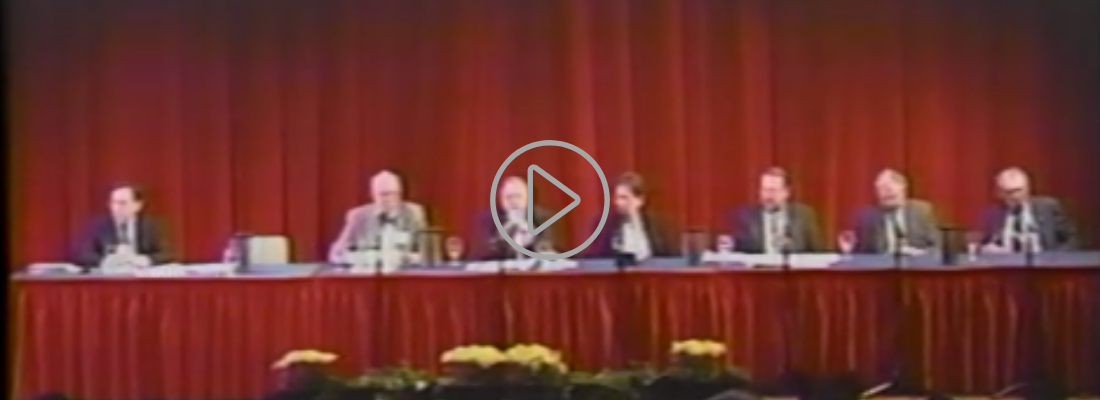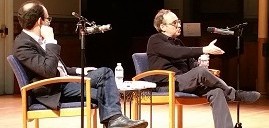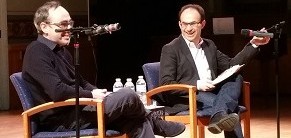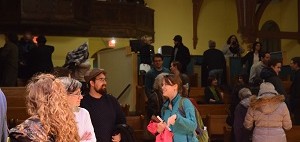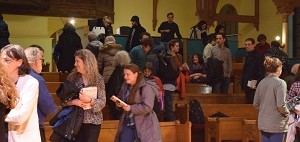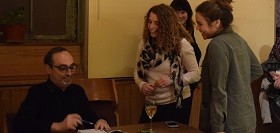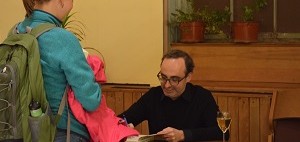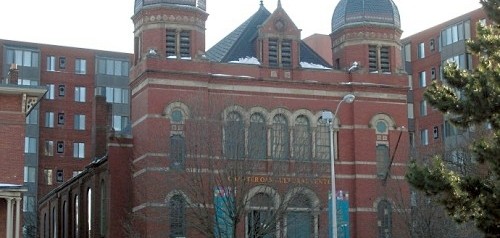Prof. Nick Underwood presented “The World of Yiddish Theatre in History and Digital” on July 13, 2020 as part of the new Virtual Festival of Yiddish Culture, a project of the UConn Center for Judaic Studies in partnership with the Jewish Hartford European Roots Project. The world of Yiddish theatre traverses the globe. Over roughly the past century and a half, Yiddish theatre, which has its roots in Purim, has engaged millions of people and has embraced several artistic and theatrical forms. Its story is not only in the past, however, it is still going strong, and has even found a home on the internet. Through an exploration of Yiddish theatre from its origins to today, participants will discover the world of Yiddish theatre and learn about the ways that the medium has come into contact with the digital age. Nick Underwood is Assistant Professor of History and Berger-Neilsen Chair of Judaic Studies at The College of Idaho.
Recaps
Watch: Nobel Laureate Address by Elie Wiesel (1995)
Watch: 1995 Holocaust Survivors’ Panel | Center for Judaic Studies 11th Academic Convocation on the Holocaust
Professor Lewis Gordon Presents on the History of Jews of Color
Lewis Gordon, professor of Philosophy and Africana Studies, presented “Hidden Communities: Jews of Color in North America” as part of the Center for Judaic Studies’ Road Show series. The event was held on April 17 at the West Hartford Public Library and sponsored by Kehilat Chaverim.
Professor Gordon spoke to a large turnout on the history of Jews of color and their absence from the historical narratives most are familiar with and reflected on the importance of recognizing the full spectrum of Jewish diversity.
Professor Lewis Gordon teaches courses in philosophy, Africana studies, and Judaic studies at UConn and at universities in Europe, Africa, and the Caribbean.
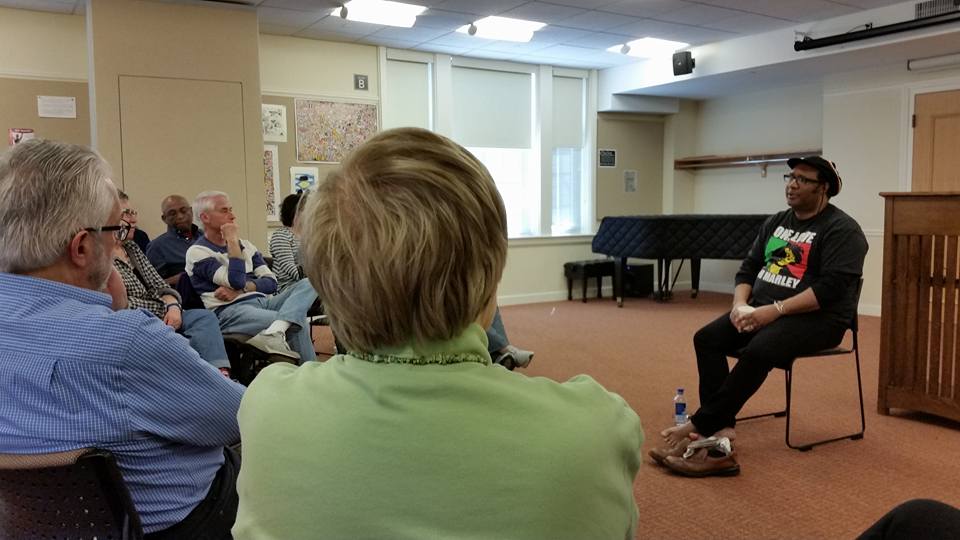
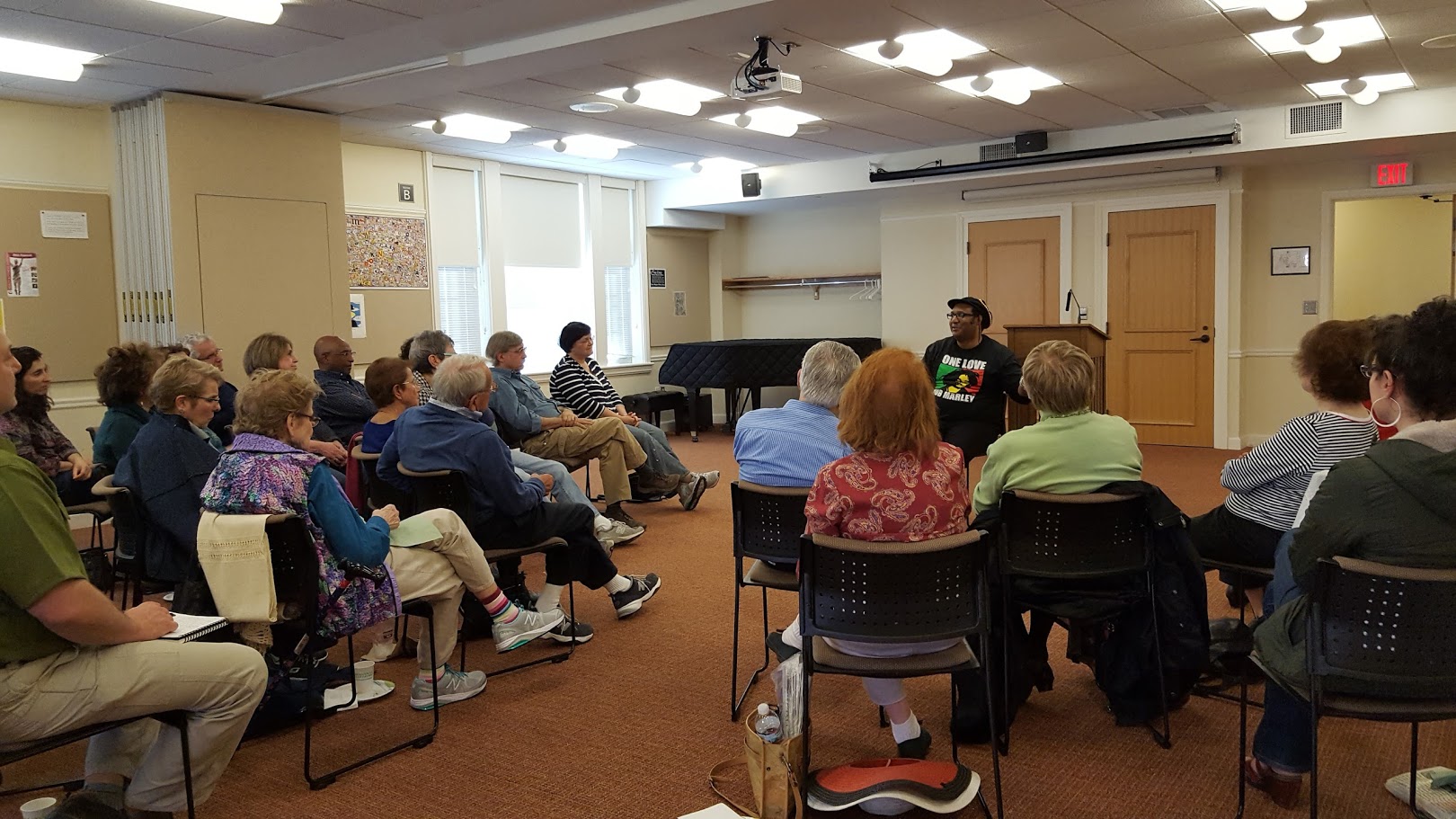
Gary Shteyngart Delights at the Charter Oak Cultural Center
Over 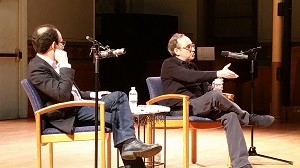 one hundred attendees were present at the Charter Oak Cultural Center in Hartford on February 25 for an exciting evening with satirist Gary Shteyngart whose New York Times best-selling novels have won numerous awards and been heralded by Time magazine, The New Yorker, The Guardian, The New York Times Book Review, Washington Post, Chicago Tribune, and San Francisco Chronicle.
one hundred attendees were present at the Charter Oak Cultural Center in Hartford on February 25 for an exciting evening with satirist Gary Shteyngart whose New York Times best-selling novels have won numerous awards and been heralded by Time magazine, The New Yorker, The Guardian, The New York Times Book Review, Washington Post, Chicago Tribune, and San Francisco Chronicle.
Professor Sasha Senderovich, assistant professor of Russian Studies and Jewish Studies at the University of Colorado, Boulder, facilitated a conversation with the author, and the exchange provided for a very warmly received evening of entertainment as Shteyngart discussed his books and his dual childhood experiences growing up in Soviet Russia and as an immigrant American. Shteyngart shared stories of his early life in Russia as Vladimir Lenin’s biggest fan and as the unhappy recipient of fire cupping treatments, an alternative medical practice in which suction cups were placed on the patient to create a vacuum that would supposedly release toxic substances from the bloodstream.
At the age of seven, Shteyngart’s family left Leningrad and settled in New  York where he was enrolled in the Solomon Schechter School of Queens and spent his youth writing stories to be read aloud to his classmates and hiding salami in his pockets. Shteyngart grew up in a Russian-speaking household where, in place of a television, there were stacks of Chekhov and Dostoevsky. He attended Stuyvesant High School in New York City and is a graduate of Oberlin College in Ohio. Shteyngart earned an MFA in creative writing at Hunter College and teaches creative writing at Columbia University.
York where he was enrolled in the Solomon Schechter School of Queens and spent his youth writing stories to be read aloud to his classmates and hiding salami in his pockets. Shteyngart grew up in a Russian-speaking household where, in place of a television, there were stacks of Chekhov and Dostoevsky. He attended Stuyvesant High School in New York City and is a graduate of Oberlin College in Ohio. Shteyngart earned an MFA in creative writing at Hunter College and teaches creative writing at Columbia University.
The audience was treated to a book reading of several hilarious passages from Shteyngart’s work followed by a question and answer session. The evening was capped off by a book signing and the opportunity to speak and take pictures with the author.
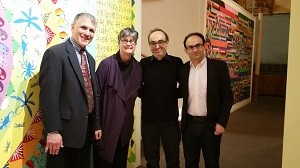
An Evening with Gary Shteyngart was a free event, open to the public, and co-sponsored by the Center for Judaic Studies and Contemporary Jewish Life at UConn and the Charter Oak Cultural Center in Hartford. According to the Center’s director, Professor Jeffrey Shoulson, the new partnership between the Center and Charter Oak is a vital way to support, sustain, and foster Jewish culture and the arts beyond the campus, and the attendance by students to these events helps to develop a relationship between the University and greater community.
The next event being co-sponsored by the Center for Judaic Studies and Charter Oak will be held on April 7 when the Guy Mendilow Ensemble will perform Tales from the Forgotten Kingdom, a musical journey through the Balkans to the Mid-East. Transportation to and from Storrs campus will be provided to students, faculty, and the community. We hope you will join us!
Dr. Alon Segev Presents “A Theologian in Support of National Socialism: The Case of Gerhard Kittel”
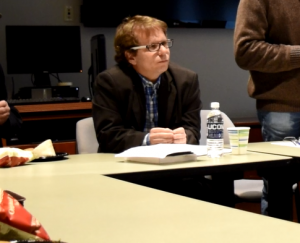 At our recent, February 17, faculty colloquium, Dr. Alon Segev presented “A Theologian in Support of National Socialism: The Case of Gerhard Kittel.” Dr. Segev, who has published extensively on Holocaust studies, modern German philosophy, and classical and modern philosophy, is currently a visiting scholar with UConn’s philosophy department and has also been a visiting scholar at Stanford, Berkeley, Pittsburgh and Arizona Universities, the University of Jerusalem and Stellenbosch University in South Africa.
At our recent, February 17, faculty colloquium, Dr. Alon Segev presented “A Theologian in Support of National Socialism: The Case of Gerhard Kittel.” Dr. Segev, who has published extensively on Holocaust studies, modern German philosophy, and classical and modern philosophy, is currently a visiting scholar with UConn’s philosophy department and has also been a visiting scholar at Stanford, Berkeley, Pittsburgh and Arizona Universities, the University of Jerusalem and Stellenbosch University in South Africa.
Dr. Segev provided an examination of the writings of influential German theologian Gerhard Kittel on the “Jewish question.” Kittel served 17 months in prison after World War II while awaiting trial for his role in spreading antisemitic propaganda. While in prison, Kittel wrote a manuscript exculpating himself from blame for any Nazi atrocities committed against the Jews. According to Kittel, his antisemitism was unlike the crass or rowdy antisemitism of the Nazis and was instead an antisemitism rooted in Christian theology.
As Dr. Segev illustrated, for Kittel, the “Jewish problem” was grounded not in economics, as Marx would have it, or in race, as Dühring argued, but in theology; and only a theological solution could be applied. Kittel maintained that the Nuremberg laws reflected the divine punishment God had meted out against the Jewish people when he dispersed them throughout the world to live at the mercy of foreign governments. Kittel used theological arguments to support the legal practices of National Socialism which denied Jews their civil rights while insisting that he had used his influence within the party to elevate Nazi ideology from its vulgar foundations.
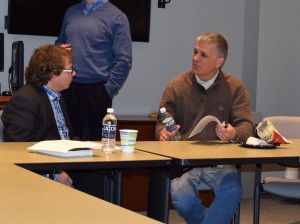 Dr. Segev’s illuminating presentation was followed by questions and discussion from the students and faculty in attendance. Our ongoing colloquium series occurs on a monthly basis and features the research of faculty and graduate students in an informal setting that allows for conversation and dialog about evolving work.
Dr. Segev’s illuminating presentation was followed by questions and discussion from the students and faculty in attendance. Our ongoing colloquium series occurs on a monthly basis and features the research of faculty and graduate students in an informal setting that allows for conversation and dialog about evolving work.
Dr. Segev was a Max-Planck Minerva Fellow in the department of philosophy at the University of Heidelberg and a DFG (Deutsche Forschungsgemeinschaft) fellow at the Martin-Buber Institute at the University of Cologne. His book, Thinking and Killing: Philosophical Discourse in the Shadow of the Third Reich (New York / Berlin: Walter de Gruyter 2013) examines the contribution of eight German thinkers to the discussion about the Holocaust and the Final Solution. His current work investigates the political readings of Descartes, Hannah Arendt, and Gerhard Kittel.
A warm thanks to Professor Segev for sharing his research with us!
Abigail Miller Presents Jewish Resettlement in Argentina and Holocaust Memory
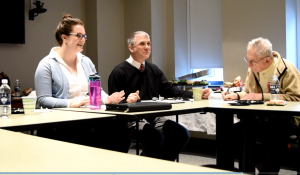 In our first faculty colloquium of the Spring 2016 semester, Abigail Miller, a third year doctoral student at the Strassler Center for Holocaust and Genocide Studies at Clark University in Worcester, Massachusetts, presented “Refugee-Survivors: Jewish Resettlement in Argentina and Holocaust Memory.” Miller, who holds the Strassler Center’s Tapper Fellowship, is currently examining the resettlement experiences of Jewish refugees in Argentina during and after the Holocaust with particular attention to the ways in which Holocaust memory and trauma affected both their resettlement and their new lives in Argentina.
In our first faculty colloquium of the Spring 2016 semester, Abigail Miller, a third year doctoral student at the Strassler Center for Holocaust and Genocide Studies at Clark University in Worcester, Massachusetts, presented “Refugee-Survivors: Jewish Resettlement in Argentina and Holocaust Memory.” Miller, who holds the Strassler Center’s Tapper Fellowship, is currently examining the resettlement experiences of Jewish refugees in Argentina during and after the Holocaust with particular attention to the ways in which Holocaust memory and trauma affected both their resettlement and their new lives in Argentina.
Argentina hosts the largest Jewish population in South America, and, with the exception of Palestine, received more Jewish refugees after World War II than any other country. Narratives of loss dominate the oral histories of Jewish refugees from the 1930s and 40s in Argentina’s Jewish community. Many losses were endured, including the loss of family and friends to the Nazi regime, the loss of physical spaces from home to school to city, and the loss of emotional security, family unity, and the connection to their previous lives in Europe.
Through study of oral history narratives (both archival and those she herself has conducted in Argentina) diaries, letters, and documents from Jewish social service agencies, Miller discovered that many refugees had a great deal of difficulty assimilating both to the extant Jewish community and to the greater Argentinian culture while other narratives revealed refugees who thrived and assimilated relatively quickly and easily. While some seemed to be able to compartmentalize their experiences and move forward, others were haunted by their experiences of victimization, indicating the way Holocaust memory shapes the refugee response to the challenges of resettlement.
Miller’s presentation included several refugee profiles whose experiences shared many commonalities but all with unique details and challenges. Noting that current refugee policies are often universalized, Miller hopes that in providing both the historical insight and particular information on the unique experiences of individual survivors, her work can be used to better design response and recovery programs for today’s refugees.
Miller is a visiting lecturer at Trinity College in Hartford where she teaches a seminar on Holocaust History and Film. She also teaches a course on Responses to the Holocaust at the University of Hartford. Prior to her doctoral studies, Miller earned a master’s degree in history from West Virginia University and a master’s degree in international relations from Collegium Civitas in Warsaw, Poland. Her presentation was both fascinating and topical, and we very much look forward to learning more about her research as it progresses!
The Center for Judaic Studies Celebrates 36 Years!
Dr. Emily Sigalow Presents on Jewish Meditation
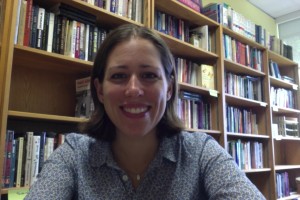 Professor Emily Sigalow, a Postdoctoral Fellow in the Department of Sociology at Brandeis University, presented “Making Meditation Jewish: The Construction of a New Contemplative Jewish Practice” at our recent, November 12, faculty colloquium.
Professor Emily Sigalow, a Postdoctoral Fellow in the Department of Sociology at Brandeis University, presented “Making Meditation Jewish: The Construction of a New Contemplative Jewish Practice” at our recent, November 12, faculty colloquium.
Dr. Sigalow holds a PhD in Near Eastern and Judaic Studies and Sociology from Brandeis University, and her research interests focus on the sociological study of contemporary Jewish life. Prior to studying at Brandeis, Dr. Sigalow spent five years working and studying in Israel and obtained her M.A. from Ben-Gurion University. In her work, Dr. Sigalow examines the interplay between Judaism and Buddhism in America; and her current manuscript, The JUBUs: The Encounter between Judaism and Buddhism in America, traces the way in which practices in Judaism and Buddhism evolved in relation to each other in America since 1893. Continue reading
Professor Barry Kosmin Discusses Anti-Semitism on Today’s Campuses
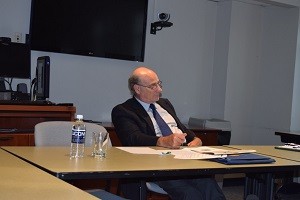 Professor Barry Kosmin, of Trinity College, presented “Anti-Semitism and Today’s Campus Environment: Methodological Challenges and Substantive Findings” at our recent, October 15th, faculty colloquium. Later that day, he presented a public lecture, entitled “La Trahison des Clercs: Accounting for the Persistence of Anti-Semitism and Judeophobia in the University and Among the Intelligentsia.”
Professor Barry Kosmin, of Trinity College, presented “Anti-Semitism and Today’s Campus Environment: Methodological Challenges and Substantive Findings” at our recent, October 15th, faculty colloquium. Later that day, he presented a public lecture, entitled “La Trahison des Clercs: Accounting for the Persistence of Anti-Semitism and Judeophobia in the University and Among the Intelligentsia.”
Dr. Kosmin, director of the Institute for the Study of Secularism in Society and Culture, is a principal investigator of the American Religious Identification Survey series and is an internationally renowned expert in Jewish demography. He was the director of the CJF 1990 U.S. National Jewish Population Survey, the American Jewish Identity Surveys of 2001 and 2008, and the 1998 National Survey of South African Jews. Continue reading
